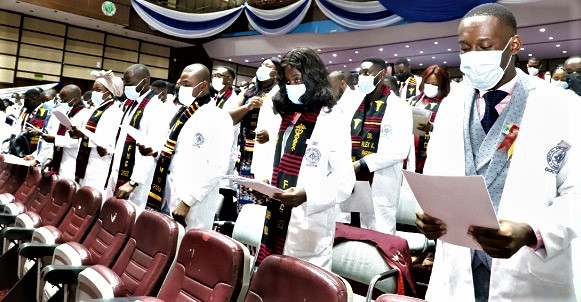Medical, Dental Council inducts 138 new doctors
- Posted on
- Comment

The Medical and Dental Council of Ghana (MDCG) last Friday inducted 138 new doctors into the council, with a charge on them to exhibit high standards of professionalism and conduct in their various fields.
A Deputy Minister of Health, Gifty Tina Naa Ayeley Mensah, who gave the charge, said in keeping up with the high regard that society had for healthcare professionals, they were expected to act accordingly.
“Often, the allure of specialised knowledge and success, if not properly managed, tend to result in bloated egos or inconsiderate conduct and may make one lose his humanity – the capacity to care,” she added.
Ms Mensah said recent media reportage on professional negligence, improper conduct and unethical behaviour by health professionals was completely unacceptable, given that as practitioners, they swore oaths to serve people in their most vulnerable states.
Commitment
To address that, she said, in accordance with the ministry’s focus on issues of professional and institutional accountability, the MDCG would hold a Policy Launch and Dialogue Session to outdoor a number of policy guidelines developed.
She reiterated the government’s commitment to ensure that people had access to quality healthcare services by boosting the provision of healthcare infrastructure through the Agenda 111 project.
“Under the Agenda 111 project, the government will design, procure, construct, equip and commission 101 district hospitals, six regional hospitals in the newly created regions, in addition to one regional hospital in the Western Region, two psychiatric hospitals in Kumasi and Tamale and redevelop the Accra Psychiatric Hospital,” she explained.
Posting, technology
In a speech, the Dean of the University of Ghana Medical School, Prof. Margaret Lartey, on behalf of the Chairman of the MDCG, urged the newly inducted doctors to accept posting and refrain from trying to change it, adding that they were expected to engage their housemanship as full-time job.
“The council’s attention has been drawn to the fact that many people are doing the house job on a part-time basis. Some of you apply for full-time academic programmes and spend the house job time attending lectures at the various universities,” she said.
She also advised the inductees to build their capacity in the technology landscape, in line with the increase in the use of technology worldwide and the digitalisation of many processes.
That, she said, created an opportunity for them to improve their typing skills and computer literacy in general, so that entry of patient data did not become a barrier to health care.
“Electronic does not equate to scanty, as is already being experienced at some sites. The council encourages you to provide comprehensive information on all your patient encounters,” she added.
Inductees
Out of the 138 inductees, three were dentists, while the remainder were general practitioners.
They were products of five tertiary institutions across the country and foreign trained doctors.
These are the Accra College of Medicine, the University of Cape Coast, the School of Medical Sciences, Kwame Nkrumah University of Science and Technology, Kumasi, and the School of Medicine and Dentistry, Kumasi.
The rest were the University of Ghana Medical School, Accra; the University of Health and Allied Sciences School of Medical Sciences, Ho; and Foreign-trained doctors who passed the council’s registration examination.
-Graphic






 (Selorm) |
(Selorm) |  (Nana Kwesi)
(Nana Kwesi)